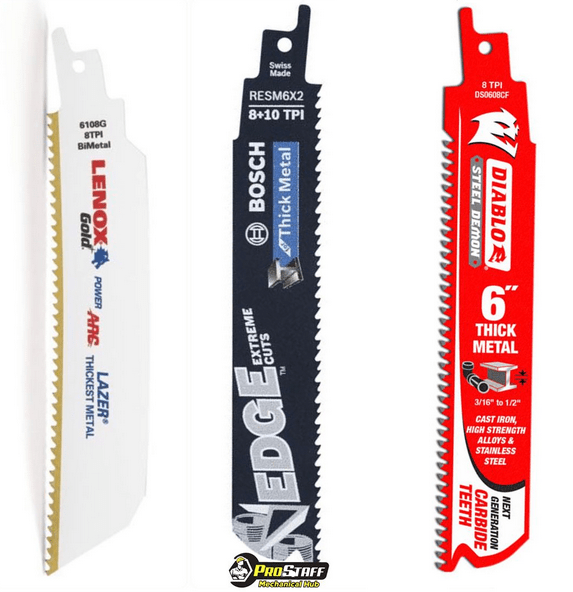Reciprocating saw blades have advanced considerably over the last few years with the addition of carbide cutting edges. Until about three years ago the very idea of using a sawzall to cut materials like cast iron or stainless steel proved daunting in the least. With today’s latest manufacturing technology tasks such as this are simple and no longer require the use of a dirty, dangerous angle grinder when the repair soil pipe snapper wont fit. The two well known brands of carbide tipped blades on the market in North America are produced by Diablo Tools (Steel Demon) and Milwaukee Tool (Ax).
In an effort to compare readily available blades intended specifically for the use of cutting heavy/thick metals I chose three blades available at either plumbing/hvac/electrical supply houses or local big box stores. The Diablo blade is the only carbide tipped blade in this test. Milwaukee’s Ax carbide is not rated for heavy metal cutting, only nail embedded wood so it was not tested. Here are the blades, tool used material cut and the results in this 3-way comparison.
Blade comparison: 2″ Sched 40 No-Hub pipe.
Tool: Makita XRJO6 36V recip saw.
Left video: Lenox Gold Power Arc Curved blade. Rated for heavy metal cutting. 8tpi, 6″.
Middle video: Bosch EDGE Extreme Cut thick metal cutting blade. 8+10 tpi, 6″.
Right video: Diablo Steel Demon carbide tip thick metal cutting 8 tpi, 6″
The Lenox and Bosch blades did finish the cut but each took about 4-5 minutes total time to do so and were not usable after one complete cut. The Bosch took nearly a minute longer and vibrated heavily in comparison to the other two. The first cut for the Diablo took 25 seconds total.
The Diablo blade continued on for 4 more cuts in 2m30s for a total of 5 cuts. The outer/end third of the blade was missing all carbide.
I bought all of these blades. The Bosch retails at locally for $13.98/3pk. The Lenox retails for $16.98/3pk, also locally. The Diablo retails locally for $29.97/3pk.
Carbide is the clear difference here. Make no mistake, these blades will not replace a soil pipe snapper but are proven to cut the pipe efficiently where a snapper might not fit or is too challenging to operate. Its my opinion that they are a much safer and cleaner alternative to using a angle grinder and cutoff wheel to cut in-place pipe. I have personally used the Diablo carbide tip blades and stock them in our fleet for use when a repair/ratchet snapper is not the best tool for the job.





Join the conversation: